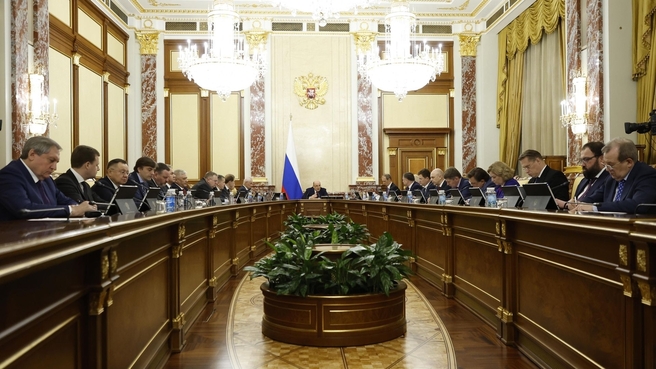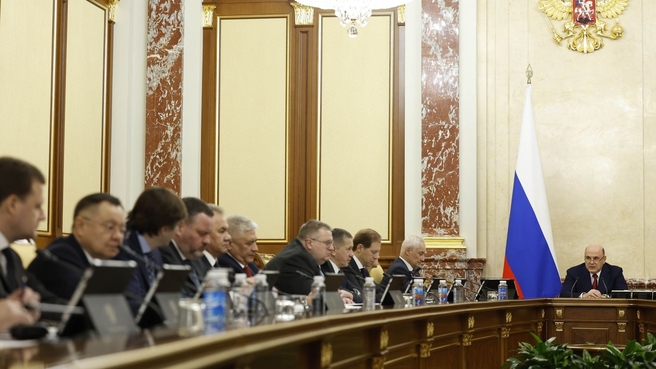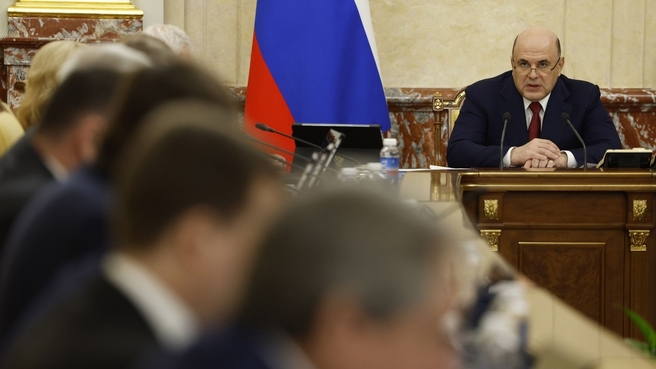Agenda: providing pensions for residents of new regions who have completed military service, expanding the domestic sports system to new regions, and making state property management more efficient.
Good afternoon, colleagues,
At the instruction of the President, we continue to work on integrating new regions into our legal field and today we will review a draft law establishing a special procedure for providing pensions to their residents who have completed military and equivalent service and their families. This applies to former military personnel, law enforcement employees, prosecutors, customs and other services.
Under the document, support in line with Russian standards will be provided to them starting 1 July, and they will need to submit an application to receive it. Special provisions have been made to account for years of service.
Importantly, the processes should be convenient for people to use. I would like the agencies that are responsible for providing pensions to these citizens be mindful of this.
Today’s agenda includes a draft law on extending the domestic sports system to the Donetsk and Lugansk people’s republics and the Zaporozhye and Kherson regions, so that local athletes, coaches and judges could use all types of state support. The document drafted by the Government will allow them to create regional federations and become full-fledged members of the Russian national federations, assign sports categories and titles, participate in competitions of any level - individually or as part of our select teams - and receive all due payments and benefits, including for winners and prize-winners. Holders of the GTO physical fitness badge will be credited with extra points when applying for Russian universities.
These measures will help primarily to preserve sports traditions, and young people will have more opportunities to achieve high results.
Now, I will say a few words about state property management.
Thousands of unused buildings and premises, land parcels and unfinished construction projects remain on the public balance sheet whereas numerous departments have to lease offices and pay the going market rates, and the budget spends significant funds to keep these sites up to standard.
The property resource should be used more rationally and its economic potential should be put to good use. Above all, this needs to be done in order to address medium- and long-term development goals by way of stimulating the use of property and land parcels in economic activity, creating proper conditions for launching investment projects and reducing federal budget spending.
This approach will help support businesses, improve urban environment and create new jobs.
Today, we will discuss the proposals that have been drafted on instruction from the President and decide on new approaches to property management and drafting legal documents.
The issue is about a package of regulations to improve the efficiency of land use. Importantly, new regulations must build on existing experience.
Another priority task includes registration by the owners of the title to the real estate that they use. There are about 40 million sites in the regions that are not properly documented, which creates risks both for the property and its commercial exploitation.
The services must be user friendly and make queries for suitable land parcels quick and free from unneeded paperwork regardless of what the applicants may need it for - the construction of a dacha, agribusiness, or other purposes. The Far Eastern Hectare programme clearly shows that this type of public service enjoys high demand.
Rosreestr (the Federal Service for State Registration, Cadastre and Cartography) is expected to submit proposals for improving legislation in this sphere soon, which will make possible the commercial exploitation of thousands of unused hectares of land. This will also help form an accurate database with answers to every meaningful question that our people may have, including questions about existing infrastructure.











